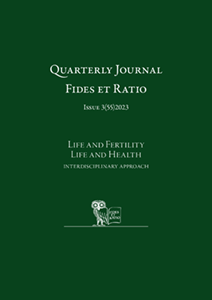Abstract
The study uses a processual approach drawing on the modern definition of reproductive health, which recommends individualised measurements of populations. A case study analysis is performed to build a comprehensive empirical model of transitions in young women’s relations with their partners and visions of motherhood, which are critical to understanding young adult females’ reproductive health. Data necessary to reconstruct the setup of individual life paths were collected using exploratory interviews and questionnaires and analysed in the framework of the Strategy of Process Transformation Reconstruction (PTR). The PTR strategy is an innovative tool that combines the qualitative analysis of individual cases and C4.5 Quinlan’s algorithm to make generalisation.
The empirical model of internally diverse types of relationships and visions of motherhood formed by young Polish women consists of a sequence of variants showing the evolution of the character, and ways of building and integrating intimate relationships with motherhood. The model can serve as a matrix for creating analytical categories that can be used to describe young women’s relations with their partners and visions of motherhood, construct psychological scales, and plan therapeutic procedures.
References
Arnett, J.J. (2004). Emerging adulthood: The Winding Road from the Late Teens Through the Twenties. New York, NY: Oxford University Press.
Bakiera, L. (2014). Zaangażowanie w rodzicielstwo na tle współczesnej rodziny. Kultura i Edukacja, 2(102), 147-172.
Bem, D. (1972). Self-Perception Theory. Advances in Experimental Social Psychology, 6, 1-62. https://doi.org/10.1016/S0065-2601(08)60024-6
Brannon, L. (2002). Psychologia rodzaju. Gdańsk: GWP.
Brzezińska, A., Piotrowski, K. (2010). Formowanie się tożsamości a poczucie dorosłości i gotowość do tworzenia bliskich związków. Czasopismo Psychologiczne, 16(2), 265–274.
Clark, M.S., Fitness, J., Brissette, I. (2007). Understanding People’s Perceptions of Relationships Is Crucial to Understanding their Emotional Lives. (In:) M.B. Brewer, M. Hewstone (eds.), Emotion and Motivation, 21–46. Blackwell Publishing. https://doi.org/10.1002/9780470998557.ch10
Cordova, J.V., Scott, R.L. (2001). Intimacy: A behavioral interpretation. The Behavior Analyst, 24(1), 75–86. https://doi.org/10.1007/BF03392020
Czarnecka, M. (2019). Dojrzałe macierzyństwo a kształtowanie więzi emocjonalnej z dzieckiem w okresie prenatalnym. Forum Pedagogiczne, 9(2), 151-164. https://doi.org/10.21697/fp.2019.2.34
Czyżowska, D., Gurba, E. (2016). Bliskość w relacjach z rodzicami a przywiązanie i poziom intymności u młodych dorosłych. Psychologia Rozwojowa, 21(4), 91-107.
Dankiewicz-Berger, M., Cendal, S. (2019). „Macierzyństwo nowoplemienne” – analiza jakościowa parentingowych komunikatów internetowych. Annales Universitatis Paedagogicae Cracoviensis. Studia Psychologica, 12, 237–258. https://doi.org/10.24917/20845596.12.12
Długosz, P. (2017). Pokolenie przegranych? Kondycja psychospołeczna młodzieży w Europie Środkowo-Wschodniej. Zeszyty Pracy Socjalnej, 21(2), 77–90. https://doi.org/10.4467/24496138PS.16.006.6276
Havighurst, R. (1981). Developmental tasks and education. New York: Longman.
Hays, S. (1996) The Cultural Contradictions of Motherhood. Yale: University Press, New Haven, CT.
Hochschild, A.R. (2003). The Commercialization of Intimate Life. Notes from Home and Work. University of California Press.
Jensen, A.J. (1997). Young people’s conception of transition to adulthood. Youth and Society, 1, 3-23.
Kaschak, E. (2001). Nowa psychologia kobiety. Podejście feministyczne. Gdańsk: GWP.
Lindell, A.K., Campione-Barr, N., Killoren, S.E. (2017). Implications of parent–child relationships for emerging adults’ subjective feelings about adulthood. Journal of Family Psychology, 31(7), 810–820. https://doi.org/10.1037/fam0000328
Maciąg-Budkowska, M., Rzepa, T. (2017). Jaka jest „idealna matka”? Rozumienie roli matki przez współczesne kobiety. Annales Universitatis Maria Curie-Sklodowska Lublin – Polonia, Vol. XXX, 3, Sectio J., 93-107. https://doi.org/10.17951/j.2017.30.3.93
Mandal, E. (2000). Podmiotowe i interpersonalne konsekwencje stereotypów związanych z płcią. Katowice: Uniwersystet Śląski.
Mandal, E., Lip, M. (2022). Mindfulness, relationship quality, and conflict resolution strategies used by partners in close relationships. Current Issues in Personality Psychology, 10(2), 135–146. https://doi.org/10.5114/cipp.2021.111981
Michaeli, Y., Hakhmigari, M.K., Scharf, M., Shulman, S. (2018). Romantic Outcomes in Young Adulthood: The Role of Dependency, Parental Support, and Reflective Functioning. Journal of Family Psychology, 32(7), 873–881. https://doi.org/10.1037/fam0000441
Moir, A., Jessel, D. (1993). Płeć mózgu. Warszawa: Państwowy Instytut Wydawniczy.
Palus, K. (2010). Wybrane psychologiczne uwarunkowania braku partnera życiowego w okresie wczesnej dorosłości. Poznań: Wydawnictwo Naukowe Wydziału Nauk Społecznych Uniwersytetu im. Adama Mickiewicza.
Pedersen, S., Lupton, D. (2018). ‘What are you feeling right now?’ Communities of maternal feeling on Mumsnet. Emotion, Space and Society, 26(2), 57-63. https://doi.org/10.1016/j.emospa.2016.05.001
Plantin, L., Daneback, K. (2009). Parenthood information and support on the internet. A literature review of research on parents and professionals online. Bmc Family Practice, 10(1), 1-12. https://doi.org/10.1186/1471-2296-10-34
Pożegnanie z Matką Polką? Dyskursy, praktyki i reprezentacje macierzyństwa we współczesnej Polsce. (2012). R. Hryciuk, E. Korolczuk (red.). Warszawa: Wydawnictwa Uniwersytetu Warszawskiego. https://doi.org/10.31338/uw.9788323511175
Prężyna, W. (1996). Obraz siebie i partnera a wzajemna atrakcyjność w diadzie mieszanej. Roczniki Filozoficzne, 44(4), 75-133.
Pufal-Struzik, I. (2017). Aktywność zawodowa współczesnych kobiet–trudności w realizacji nowych ról i tradycyjnych obowiązków. Polskie Forum Psychologiczne, 22(2), 242-257.
Pustułka, P., Buler, M. (2020). (Wyboista) droga do macierzyństwa. Tranzycje do macierzyństwa w perspektywie trzech pokoleń Polek oraz ekspertek i ekspertów. Youth Working Papers, 3. Warszawa: SWPS Uniwersytet Humanistycznospołeczny – Młodzi w Centrum LAB. https://doi.org/10.23809/10
Nisbet, R., Miner, G., Elder, J. (2009). Handbook of Statistical Analysis and Data Mining Applications. Cambridge, MA: Academic Press.
Quinlan, J.R. (1993). C4.5: Programs for machine learning. San Mateo: Morgan Kaufman Publishers.
Reis, H.T. (2012). Perceived partner responsiveness as an organizing theme for the study of relationships and well-being. (In:) L. Campbell, T.J. Loving (eds.), Interdisciplinary research on close relationships: The case for integration, 27–52. American Psychological Association. https://doi.org/10.1037/13486-002
Rzechowska, E. (2021). On the nature of qualitative research in process transformations: the changing man in the changing world. (In:) N. Rezaei (ed.), Integrated Science: Science without Borders, 57-79. Springer International Publishing. https://doi.org/10.1007/978-3-030-65273-9
Rzechowska, E., Krawiec, B. (2016). Młodzi dorośli: ścieżki życia w kontekście przemian. Lublin: Katedra Psychologii Rozwojowej KUL (unpublished material).
Rzechowska, E., Szymańska, A. (2017). Wykorzystanie strategii Rekonstrukcji Transformacji Procesu do budowy skali psychologicznej. (In:) W.J. Paluchowski (ed.), Diagnozowanie – wyzwania i konteksty, 31–58. Wydawnictwo Naukowe WNS UAM.
Sadana, R. (2002). Definition and measurement of reproductive health. Bulletin of the World Health Organization, 80 (5), 407-409.
Sikorska, M. (2019). Praktyki rodzinne i rodzicielskie we współczesnej Polsce–rekonstrukcja codzienności. Warszawa: Wydawnictwo Naukowe Scholar.
Wiszejko-Wierzbicka, D., Kwiatkowska, A. (2018). Wchodzenie w dorosłość. Ogólnopolskie badanie młodych Polaków w wieku 18–29 lat. Studia Socjologiczne 2(229), 147–176. https://doi.org/10.24425/122467
Żelazkowska, M. (2016). Wczesne macierzyństwo. Kryzys czy szansa? Olsztyn: Szkoła Wyższa im. J. Rusieckiego.

